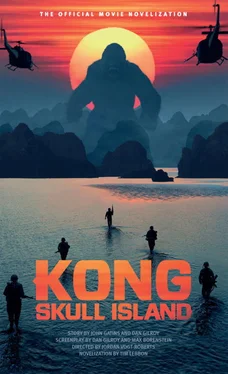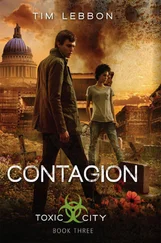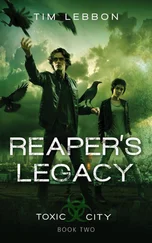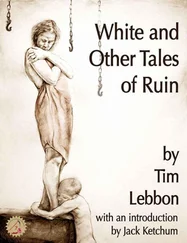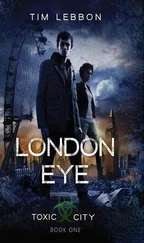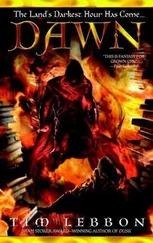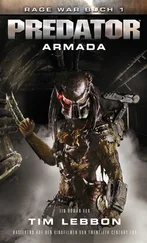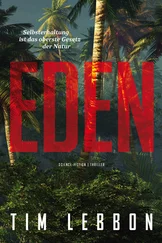They followed him again, shifting direction and heading up a steep slope towards a tree-smothered ridge line. There was little to be seen, even from that high up, because the foliage was so dense. They took a quick breather, then continued down the other side.
Weaver was fascinated watching Conrad work. He was clearly tracking the other group, although most of the time she couldn’t see what he did. He paused frequently, checking branches and leaves, crouching to look at the ground, touching scuff marks on tree bark, sniffing the air. She was close behind him, observing but not wishing to interrupt his flow, when he froze.
She sensed his tension as he looked across the valley that suddenly opened out before them.
They had reached the edge of a tree line, and now another startling truth hit home.
“This island was inhabited!” Brooks said.
Ruins filled the valley, vast structures of angular grey rock, almost chalk-white in places, some vaguely pyramidal and some more like long, high walls. Creepers and undergrowth had smothered some of the lower reaches, but the higher ruins remained relatively plant-free. They protruded from the jungle in several places, and Weaver could make out a pattern that connected all the ruins into one huge settlement.
There was writing on the stonework in no language she had ever seen. It was bright red, like blood.
That’s not ancient , she thought. The sun would have bleached it, rain washed it away. That’s recent.
“Not was inhabited,” Conrad said. “It is inhabited.” He drew his pistol and held it down by his leg, and Weaver felt a deep pang of unease.
Something about the whole scene changed. It was a fluid motion, something that almost fooled the eye and made Weaver sway and feel queasy. The constant heat that stuck her clothes to her body with sweat seemed to fade, and a chill pulsed through her veins.
People were appearing as if from nowhere. Close to them, men and women manifested from the jungle, their movements the only sign of their existence. Their camouflage paint was perfect, blending them into the jungle in shades of green and brown that made them almost invisible. Further away, other people were moving towards them from the buildings, their bodies also camouflaged with pale paint and coloured shapes that blended them in with the edifices.
Their clothing was similarly decorated, hoods and swathed skirts matching the colours splayed across their exposed skin.
They came with strung arrows and heavy spears aimed at the small group.
Slivko raised his M-16, and Weaver saw Conrad lifting his pistol, his body tensing into the beginnings of a shooting stance.
No , she wanted to say, but she also realised the danger this situation presented. She became the observer, raising her camera, dreading what she was about to see and record. And in that moment—one of a thousand when she had been preparing to witness and document violence from the outside, rather than from within—she realised that she was always the observer. She’d believed all along that the camera brought her closer to the truth.
In reality, it insulated her from it.
“Woah!” a voice shouted. “No need for that! Everybody keep your wigs on, now.” A bearded man emerged from the jungle and ran towards them through the painted men and women. He was taller, paler, so obviously not one of them, yet none of the tribespeople even looked at him.
He was dressed in a torn and tattered Air Force jumpsuit that had been patched and sewn multiple times, a parachute harness fashioned into a belt, and well-worn combat boots.
“What the…?” Brooks said from behind Weaver.
Quite , she thought.
Conrad shifted his aim to this new target. The man skidded to a halt with his hands held out, and then he smiled, poor teeth grinning through a mass of beard. It was his eyes that really defused the situation. Weaver could see the joy there, the honest delight at seeing them all. She already knew that he would have such tales to tell.
Conrad slowly lowered his gun and gestured for Slivko to do the same. The soldier only half-lowered the M-16, and the two groups stood facing each other, weapons to hand, with this wild bearded man the only thing between them.
“Combat boots,” Conrad said, as if that might explain something.
“Look at you!” the man said. He was almost dancing on the spot. “I didn’t believe it when they said you were coming! I was up all night just thinking about how many times Gunpei and I dreamed of this moment, and now here it is! Twenty-eight years, eleven months, and eight attempts to get back to the world, and instead it comes to me. Not that I’m complaining. I never saw anything more magnificent in my whole life. You’re more beautiful than a beer and a brat on a summer day at Wrigley. And you’re real.” He came forward and touched Conrad’s shoulder, flinching back as if expecting him to disappear in a puff of smoke. “Yes you are! Hey, that was a hell of an entrance. What were you bombing out there? Not smart.” He grew even more excited as he suddenly remembered something else. “And what are those wingless planes with the eggbeaters on top?”
“Helicopters,” Conrad said.
“You crashed here?” Weaver asked.
The man seemed to gather himself, realising that this small group were staring at him with shock and surprise.
“Oh, yeah, sorry. Lieutenant Hank Marlow of the Forty-Fifth.” He raised his eyebrows, grinning. “I even put on the old flight suit for you.” He nodded at Slivko. “You can put that down, now. You really should. The Iwi won’t hurt you.”
Slivko lowered his M-16. “There’s something out there, man.”
“Oh, there’s a lot out there!” Marlow said. “Come on, we gotta get back home.”
“Home?” Conrad asked. He glanced at Weaver. She shrugged.
Then she raised her camera and Marlow posed for her with a wild, delighted grin.
Conrad let Marlow and the tribespeople lead them down towards the valley floor. Their footsteps were loud and clumsy compared to these island people, who seemed almost to flow rather than walk. Even Marlow made barely a sound as he moved. Conrad could only marvel at how good they were at not attracting attention to themselves. If this island proved to be as dangerous as he was beginning to suspect, that was an essential survival instinct.
They passed through the ruins that were not really ruins, and Conrad had a chance to observe more closely. Some of the buildings did appear abandoned, or meant for some obscure purpose he could not identify, although he guessed they were still maintained to some extent. There was no telling how old they were.
They emerged close to the river, and there were more tribespeople waiting by several skiffs moored at the bank.
“We need to find our people,” Conrad said.
“You will. I’ll help you.” Marlow gestured at a skiff. “For now, though, you’re safest with us. Who knows what the hell you’ve woken out there with your noisy arrival.”
Conrad considered for a moment, then climbed into the skiff, followed by the rest of their small group of survivors. Marlow joined them in their boat, and for that he was glad.
Their skiff was pushed from the bank and into the river’s gentle flow, and several others joined them, tribespeople using long poles to shove them along. It was almost peaceful, serene, and Conrad risked a momentary lapsing of his guard. He closed his eyes and lifted his face to the sun, enjoying the heat on his dirty, sweat-streaked skin. A moment like this was valuable in recharging his batteries.
He had a feeling that he’d need them fully charged before long.
He heard the familiar shutter clicks of Weaver taking more photos, then the sounds of her changing the film in her camera.
Читать дальше
